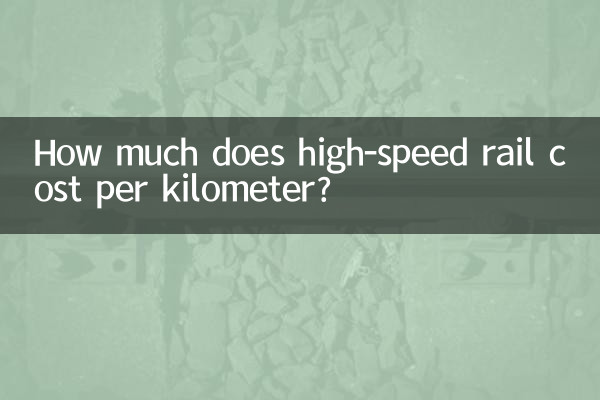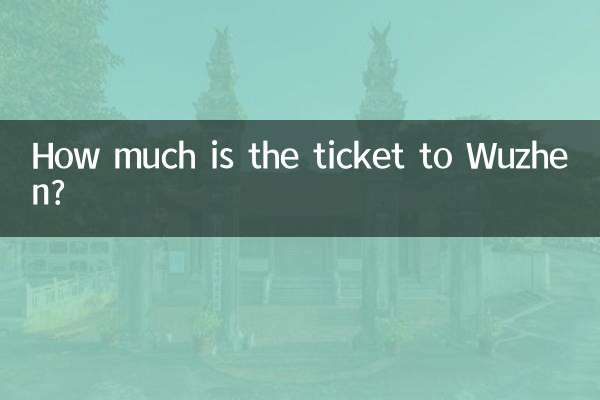How much does one kilometer of high-speed rail cost? Revealing China’s high-speed rail fares and construction costs
In recent years, high-speed rail has become an important part of China's transportation network, and its fares and construction costs have been the focus of public attention. This article will combine the hot topics on the Internet in the past 10 days to provide you with a detailed analysis of the fare and construction cost per kilometer of high-speed rail, and present it through structured data.
1. How much does the high-speed rail fare cost per kilometer?

China's high-speed rail fares vary depending on the route, vehicle type and seat class. The following are fare data for some popular routes:
| line | Mileage (km) | Second class ticket price (yuan) | Fare per kilometer (yuan) |
|---|---|---|---|
| Beijing-Shanghai High-speed Railway | 1318 | 553 | 0.42 |
| Beijing-Guangzhou High-speed Railway | 2298 | 862 | 0.38 |
| Shanghai-Kunming High-speed Railway | 2252 | 879 | 0.39 |
| Chengdu-Chongqing High-speed Railway | 299 | 96 | 0.32 |
As can be seen from the table, the high-speed rail second-class ticket price is approximately 0.32 yuan to 0.42 yuan per kilometer. The specific ticket price is also affected by operating costs, market demand and other factors.
2. How much does high-speed rail construction cost per kilometer?
The construction cost of high-speed rail is much higher than the ticket price. The following is the construction cost data of some high-speed rail lines in recent years:
| line | Mileage (km) | Total investment (100 million yuan) | Cost per kilometer (100 million yuan) |
|---|---|---|---|
| Beijing-Shanghai High-speed Railway | 1318 | 2209 | 1.68 |
| Beijing-Guangzhou High-speed Railway | 2298 | 3600 | 1.57 |
| Shanghai-Kunming High-speed Railway | 2252 | 4000 | 1.78 |
| Chengdu-Chongqing High-speed Railway | 299 | 398 | 1.33 |
The construction cost of high-speed rail is usually between 130 million yuan and 180 million yuan per kilometer. The specific cost is greatly affected by factors such as topography, proportion of bridges and tunnels, land acquisition and demolition.
3. The relationship between high-speed rail fares and construction costs
High-speed rail fares do not fully cover construction costs. Their main purpose is to cover operating costs (such as electricity, labor, maintenance, etc.). The construction costs of high-speed rail are mainly recovered through the following methods:
1. Long-term operating income: The operating cycle of high-speed rail is usually more than 30 years, and fare income is a long-term stable cash flow.
2. Land value-added income: The economic benefits brought by the appreciation of land value along the high-speed railway.
3. Social benefits: High-speed rail drives regional economic development and promotes employment and industrial upgrading.
4. Recent hot topics related to high-speed rail
1.Market-oriented reform of high-speed rail fares:Recently, some experts have suggested that high-speed rail fares should be more flexible and dynamically adjusted according to low and peak passenger flow seasons.
2.High-speed rail WiFi full coverage:China Railway Group announced that it will gradually achieve full WiFi coverage on high-speed trains to improve passenger experience.
3.High-speed rail express business:High-speed rail express business volume has grown rapidly and has become a new choice for the logistics industry.
4.Smart high-speed rail construction:Intelligent high-speed rail demonstration projects such as the Beijing-Zhangjiakou High-speed Railway have attracted attention, and autonomous driving technology will gradually be promoted.
5. Future development trends of high-speed rail
1.Fare system optimization:More flexible fare products such as discount tickets and time slot tickets may be launched in the future.
2.Construction cost control:Reduce the cost of new high-speed rail lines through technological innovation and standardization.
3.Improved operational efficiency:Use big data and artificial intelligence to optimize train dispatching and passenger flow forecasting.
4.International high-speed rail cooperation:China's high-speed rail technology will continue to go global and participate in the construction of more international high-speed rail projects.
Conclusion
The fare per kilometer of high-speed rail and the construction cost are complex economic issues that require comprehensive consideration of technology, market and social benefits. As China's high-speed rail network continues to improve and technology continues to advance, high-speed rail will continue to provide strong support for economic and social development. In the future, more intelligent and market-oriented high-speed rail services are worth looking forward to.

check the details

check the details